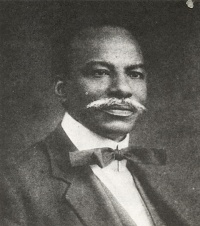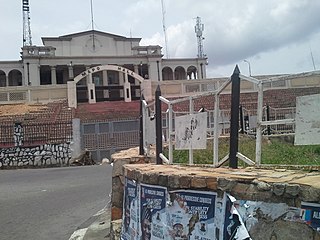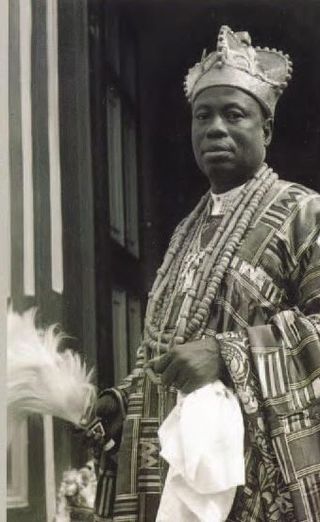Related Research Articles

Southern Nigeria was a British protectorate in the coastal areas of modern-day Nigeria formed in 1900 from the union of the Niger Coast Protectorate with territories chartered by the Royal Niger Company below Lokoja on the Niger River.
The National Council of Nigeria and the Cameroons (NCNC) later changed to the National Convention of Nigerian Citizens, was a Nigerian nationalist political party from 1944 to 1966, during the period leading up to independence and immediately following independence.

Olayinka Herbert Samuel Heelas Badmus Macaulay was a Nigerian nationalist, politician, surveyor, engineer, architect, journalist, and musician and is considered by many Nigerians as the founder of Nigerian nationalism.

Ebute Metta is a neighbourhood of Lagos Mainland, Lagos, in Lagos State, Nigeria.
Yusuf Olatunji, also known as Baba Legba or Baba L’Egbaa, was a Nigerian Sakara drum player, who popularized the sakara music style. He was purportedly born in 1905 or 1906 in a village called Gbegbinlawo in Ogun State in south-western Nigeria, although there are still doubts about the location of his birth. His mid-life conversion to Islam boosted his career in Yoruba music. He was born a Christian and he hailed from Iseyin in Oyo State. He was formerly known as Joseph Olatunji. He started his career in 1937 with his first record and he joined Abibu oluwa band in 1927.
Ernest Sissei Ikoli (1893–1960) was a Nigerian politician, nationalist and pioneering journalist; he was the first editor of the Daily Times. He was the president of the Nigerian Youth Movement and in 1942, represented Lagos in the Legislative Council.
Henry Carr was a Nigerian educator and administrator. He was one of the most prominent West Africans in the late nineteenth and early twentieth century and was a member of the legislative council in Lagos from 1918–1924.

Oloye Sir Adeyemo Alakija, was a Nigerian lawyer, politician and businessman. He served as a member of the Nigerian legislative council for nine years starting in 1933. In 1942, he became a member of the governor's Executive Council. Alakija was president of Egbe Omo Oduduwa from 1948 until his death in 1952.

Mapo Hall is the colonial-style Ibadan City Hall on top of Mapo Hill in Ibadan, Oyo State, Nigeria. Mapo Hall was commissioned during the colonial era by Captain Ross in 1929.

The CMS Grammar School in Bariga, a suburb of Lagos in Lagos State, is the oldest secondary school in Nigeria, founded on 6 June 1859 by the Church Missionary Society. For decades it was the main source of African clergymen and administrators in the Lagos Colony.

Nigerian nationalism asserts that Nigerians as a nation should promote the cultural unity of Nigerians. Nigerian nationalism is territorial nationalism and emphasizes a cultural connection of the people to the land, particularly the Niger and the Benue Rivers. It first emerged in the 1920s under the influence of Herbert Macaulay, who is considered to be the founder of Nigerian nationalism. It was founded because of the belief in the necessity for the people living in the British colony of Nigeria of multiple backgrounds to unite as one people to be able to resist colonialism. The people of Nigeria came together as they recognized the discrepancies of British policy. "The problem of ethnic nationalism in Nigeria came with the advent of colonialism. This happened when disparate, autonomous, heterogeneous and sub-national groups were merged to form a nation. Again, the colonialists created structural imbalances within the nation in terms of socio-economic projects, social development and establishment of administrative centres. This imbalance deepened the antipathies between the various ethnic nationalities in Nigeria ." The Nigerian nationalists' goal of achieving an independent sovereign state of Nigeria was achieved in 1960 when Nigeria declared its independence and British colonial rule ended. Nigeria's government has sought to unify the various peoples and regions of Nigeria since the country's independence in 1960.
Ibikunle Alfred Akitoye (1871–1928) was Oba of Lagos from 1925 to 1928 during what some historians refer to as the "Interregnum" years of the exiled Oba Eshugbayi Eleko. Ibikunle Akitoye was the first western educated and Christian Oba of Lagos. Akitoye's reign also marked the association of Lagos Obas with non-traditional religions.
Oba Eshugbayi Eleko, alias "Eleko of Eko", was the Oba of Lagos from 1901 to 1925, and from 1931 to 1932. His father was Oba Dosunmu. Eleko's struggles and legal victory over the British colonial government symbolized the struggle between indigenous rights and colonial rule in Nigeria. The outcome of the "Eleko Affair" led to the Eleko's deposition as Oba and deportation to Oyo between 1925 and 1931, years that some historians now call the "interregnum years", and that saw the reigns of Oba Ibikunle Akitoye and Oba Sanusi Olusi.

Oba Sir Musendiku Buraimoh Adeniji Adele II, KBE was the Oba (King) of Lagos from 1 October 1949 to 12 July 1964.
Chief Alimotu Pelewura, was a Nigerian trader who was leader of the Lagos Market Women's Association, a Lagos-based market women advocacy group. She was also an important political ally of Herbert Macaulay.
Oliver Ogedengbe Macaulay, alias Oged Macaulay was a Nigerian politician, archivist, journalist, public relations consultant, and private secretary to Oba Adeyinka Oyekan. He was the son of Herbert Macaulay.
Adegboyega Edun was an Egba official. He served as the secretary of the Egba United Government, a colonial-era Yoruba political entity.
Amodu Tijani v Secretary, Southern Nigeria [1921] 2 AC 399, [1921] UKPC 80, also known as the Apapa land case, was a decision of the Judicial Committee of the Privy Council concerning land title.

The Herbert Macaulay Affair is a 2019 Nigerian film based on the life of Herbert Macaulay, a Nigerian nationalist and proponent of Nigerian independence. It was directed by Imoh Umoren and featured William Benson in the lead role alongside Saidi Balogun, Kelechi Udegbe and Martha Ehinome Orhiere. The film also features Herbert Macaulay's grandson, Wale Macaulay. Other historical figures portrayed in the film include Alimotu Pelewura, leader of the Lagos Market Women's Association, Oba Eshugbayi Eleko, the Eleko of Eko at the time, Amodu Tijani Oluwa, the Chief Oluwa of Lagos and Henry Rawlingson Carr, educator and administrator.
Abibu Oluwa was a Nigerian musician known who was an early exponent of the Yoruba musical genre, Sakara. He is regarded as the first breakout start of musical genre music. Oluwa was prominent in the late 1920s and 1930s when he recorded for Odeon, HMV and Parlophone Records. His recordings with Odeon were one of the earliest Yoruba musical recordings; he sang many praise songs of Lagos elites of his time.
References
- ↑ "Herbert Macaulay celebrates with Lagos". thenationonlineng.net. Retrieved October 21, 2020.
- ↑ "Amodu Tijani, Chief Oluwa of Lagos". npg.org.uk. Retrieved October 21, 2020.
- ↑ "Amodu Tijani's case". litcaf.com. Retrieved October 21, 2020.
- ↑ "Amodu Tijani vs. Secretary, Southern Provinces". Nigerialii.org. Retrieved October 21, 2020.